Behind diamond emojis, business conferences and the quest for ‘financial freedom’ lies a multi-level-marketing scheme shrouded in secrecy. Janhavi Gosavi spoke to former members of the Legacy programme in Wellington who were drawn in by promises of ‘retire by 30’.
This feature was made with the support of the Auckland Radio Trust, sponsors of the Vince Geddes In-Depth Journalism Fund.
Your friend from high school is being weird on Instagram. They were never big on posting but now their page is littered with diamond emojis, claims about investing in themselves and manifestations of financial freedom.
They pose with mentors you didn’t know they had, wearing suits you’ve never seen them in before, talking about a side hustle they will not name.
You see group photos of them at a business conference in Melbourne, with a receipt-length caption about “becoming free from the 9-5 grind”, so you click on the tagged accounts.
All of them have words like “legacy”, “entrepreneur” and “freedom” in their bios. They all attend the same events, parrot the same inspirational quotes and post the same perfectly edited reels.
What’s going on?
Introducing Legacy Leadership, often referred to as just Legacy by its members. The name Legacy is very popular in New Zealand business and mentoring. There’s the Legacy Builders Program, offering a “step by step program to maximise profits”, the Pacific-focused Legacy Leadership Symposium, or Destiny Church’s Legacy Sisterhood programme. Legacy Leadership Ltd, though, is a multi-level marketing company shrouded in secrecy.
The name Legacy doesn’t appear on any of its members’ posts, nor does any other company name.
The Avon ladies and Tupperware parties operated in broad daylight. The Juice Plus and Enagic huns will tell you what they sell and how to join them.
You don’t pick Legacy – Legacy picks you.

The approach
Milan Singh is a brown man in his early 20s who frequents the gym. When Singh was 21, a man he didn’t know but had mutual friends with started replying to his Instagram stories. The messages began friendly but soon became more business-like. Singh says he would post a random picture and would receive messages from the man like “where do you see yourself in five to ten years?”
Singh started watching the man’s Instagram stories too. The man wore nice suits and attended business conferences. Two weeks after the first message, the man offered Singh entry into a business mentoring programme where entrepreneurs would give advice about escaping the world of the “nine to five”.
“I was like man, that sounds fucking awesome. At the time, I hated my shitty job,” Singh remembers. “As a person in my last year of uni, I was like man I’m skint. I’m out of money.”
Singh ended up in a Zoom call, which he describes as being like a job interview, with the man and the man’s mentor. He says he spotted three red flags during the call.
Red flag one: the mentor talked about how the man that had been recruiting Singh was 22 years old and getting ready to retire by age 30 but Singh remembers “they couldn’t tell me what it was that was making the money, they couldn’t tell me what it was that was helping them escape the nine-to-five lifestyle”.
Red flag two: the mentor asked if Singh wanted to get his partner into the programme as well. Singh says he was told Legacy empowered couples who wanted to own a home and retire together. It sounded like a great thing but he also felt like they were just trying to get more people on board – a “two-for-one sort of deal”.
Red flag three: Singh was instructed to read the personal finance book Rich Dad, Poor Dad by Robert Kiyosaki and report back to the mentor with his learnings.
After the meeting, Singh researched Kiyosaki, an American businessman, and found he’d filed for bankruptcy, had endorsed and co-authored books with Donald Trump, and is the subject of multiple investigative documentaries. “Why am I being recommended a book by a guy who literally doesn’t have any fucking money?”
Singh told the mentor he didn’t want to pursue the programme and blocked them.
Since then, Singh has been approached two more times by Legacy members in separate efforts to recruit him.
An approach in 2022 from a Legacy member to Milan (Screenshot: supplied)
The catch
Noah says his life was tough in 2022, so when an old friend reached out via Instagram and wanted to hang out, he was keen. Noah is also a brown man in his early 20s who likes working out.
What Noah thought would be a “catch up with one of the bros” ended up being the start of the 22-year-old’s recruitment into Legacy.
Noah’s friend took him to in-person sessions every other Tuesday, where leaders presented on self-improvement, personal finance and building good habits. They told personal stories about how this business opportunity was enabling them to pay for hospital bills and visit overseas family.
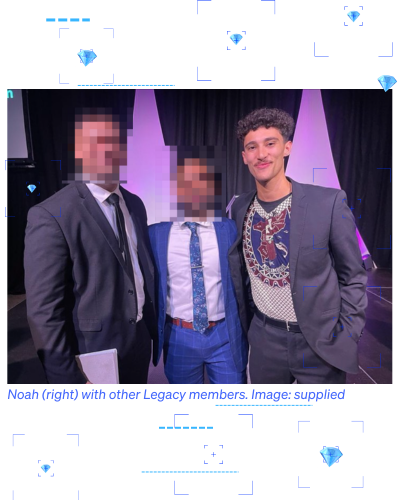
Noah says they gave a little spiel about Legacy’s connection to a big American company through the selling of the company’s products, but he was more interested in becoming a better person. “The personal development, that’s where I got hooked.”
The people at the Legacy events were empathetic and Noah recalls crying while opening up about his own problems. Within a few weeks, Noah was presented with a choice: buy into the business “partnership” by spending at least $200 per month on products from the aforementioned American company, or leave.
At the time, he was making $800 of take-home pay per month and sinking a quarter of it to stay in Legacy seemed like a good investment in his future, he says. So he bought in.
Noah says some members tried selling the products for a profit, some gave them away to family and friends, and others kept them for themselves. “They weren’t too fazed what you did with them.”
The American company in question? Amway, one of the biggest MLMs in the world.
A multi-billion-dollar MLM
Amway, short for American Way, was founded in Michigan in 1959 by businessmen Richard DeVos and Jay Van Andel. It is now a multi-billion-dollar direct selling company spread across 100 countries. It arrived in New Zealand in 1985.
Conservatism and religion are woven into the foundations of Amway, with both founders being Christian and pouring money into the US Republican party and conservative causes after becoming billionaires.
DeVos is also the father-in-law of Republican politician Betsy DeVos, who served as the United States secretary of education during Donald Trump’s first presidency and reportedly leveraged Amway’s name to influence politics in Michigan.
An Amway statement to The Spinoff said it “operates within a legal, globally recognised framework for direct selling and has done so for over 60 years”.
Amway’s business practices have been publicly criticised for as long as the company has been around, and it’s had several run-ins with the law, including pleading guilty in 1983 to evading Canadian duty taxes.
How Amway works
Direct selling companies sell products directly to consumers through independent sales reps, who often market products through events, community groups and social media. Some direct selling companies have become household names, like Tupperware and Avon.
Amway sells a vast range of pricey household products, from vitamins and makeup to protein powder and laundry detergent.
As a multi-level marketing company, there are two ways to make money with Amway.
1. Buy Amway products and sell them (direct) to customers for a profit.
2. Receive commissions or rebates based on the products you sell and the products sold by people you’ve recruited.
Direct sellers (either individual or through a company like Legacy Leadership) are Independent Business Owners (IBO) under Amway. The more money you spend on products, the more people you recruit and the longer you stay in the business, the more Amway levels you can ascend. Amway’s levels are named after precious materials, like “Gold”, “Platinum” and “Sapphire”.
The reason so many Legacy members have the diamond emoji in their Instagram bios and captions is because they’re manifesting reaching the elusive “Diamond” status.
The Amway website says if your business keeps growing, you can get travel incentives to “exotic locations”. At the end of 2024, Legacy’s members posted on social media about a business trip to Dubai, which was an Amway conference.
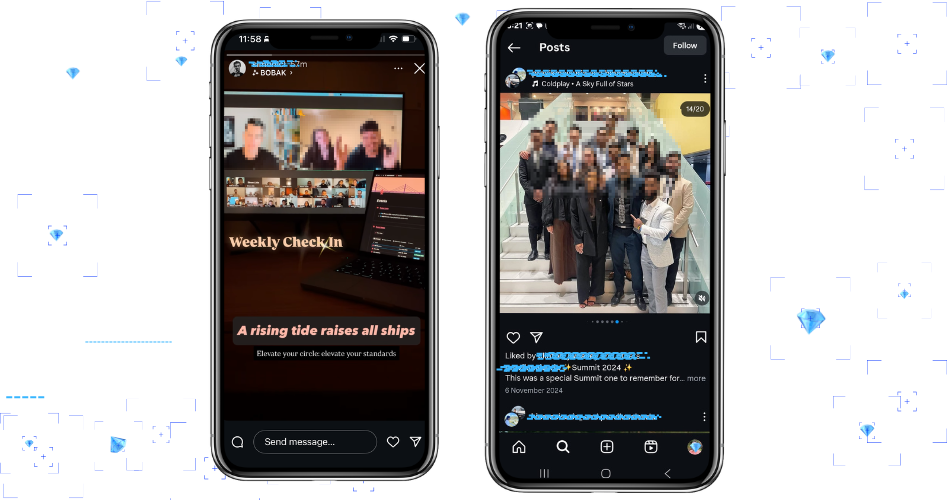
How Legacy fits into Amway
Amway says Legacy, as an IBO, is “fully independent” and can “run their businesses on their own terms”.
The company “does not direct how an IBO manages their day-to-day activities, as long as they operate within Amway’s contractual policies, rules and standards”. Amway says it has a compliance team to monitor IBOs and any violation of rules is quickly addressed.
Noah says once he officially became part of Legacy, he created an Amway account for himself which was connected to the account of the man who recruited him, and would use that account when purchasing Amway products.
The man who recruited Noah acknowledged that Noah joining Legacy financially benefitted him but told Noah he could also benefit if he started recruiting.
As a new recruit, Noah’s account was linked to his mentor. If he was able to recruit, he would have his own mentees linked to his account, still linked to his own mentor’s. To grow, Noah would have to recruit members who themselves could recruit members and so on.
Who’s at the top?
At the very top of Legacy are Jono and Kirsty Rowe. Jono Rowe did not respond to any of the interview requests made for this article but he has a large online footprint. According to a “Who Am I?” YouTube video, Rowe is a chartered accountant and a financially free, fulltime dad, husband and entrepreneur.
He used to work corporate jobs, including five years at Ernst and Young, and says he was the CFO at construction company L.T. McGuinness before stopping fulltime work in 2020. A spokesperson for L. T. McGuinness clarified to The Spinoff that Rowe worked as a “finance manager” there in that time.
Rowe created Legacy Leadership in 2019 and owns it with Kirsty, according to the Companies Office. Formerly based in Wellington, where Legacy was widely known, it appears the Rowes have relocated to Auckland in recent years.
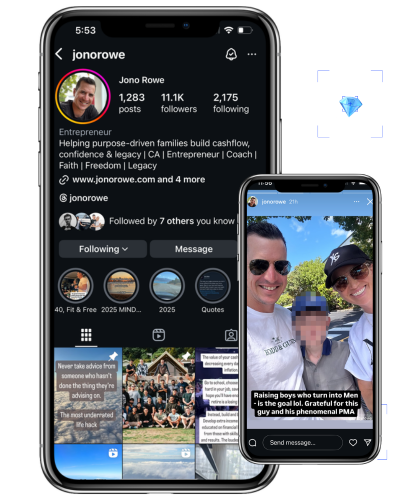
Rowe has more than 1,280 posts on Instagram, with most of them including generic inspirational quotes. Accounts he follows include Family First New Zealand, the state of Israel and the Israeli Defense Force. During the 2023 election campaign, Rowe commented frequently and supportively on Family First director Bob McCoskrie’s political videos.
On any given day, Rowe himself will post from the gym about how “the goal isn’t to be healthy, the goal is excellence”, or instruct his followers to “live for PURPOSE, not for PLEASURE”.
Rowe also posts about what it means to be a man. Earlier this year, he hosted a men’s “leadership retreat” and he posted about participants being “pushed to their physical and mental limits”, with some needing to see a doctor, sonographer and chiropractor after the retreat.
Together, Jono and Kirsty Rowe host a podcast, a blog and a separate website, where they speak about personal finance, parenting and their Christian beliefs. Rowe’s public comments in support of McCroskie’s calls for a “socially conservative” New Zealand hint at his own beliefs.
The Rowes have a commanding presence at Legacy events and in mentoring sessions. Noah likens the aura surrounding Jono in particular to that of a “prophet”. Another former member, David*, remembers a 2022 Legacy event hosted by the couple. “I went to an event of Jono and Kirsty Rowe’s and noticed that they were treated like gods. It felt weird. And everyone present were in their 20s.”
Looking around at the crowd, David remembers thinking, “All these people have been brainwashed into thinking that they will be ‘financially free’ by 30.”
The Rowes are “Independent Business Owners”, buying and selling Amway products alongside their business mentoring.
In more than 1,000 posts on Jono Rowe’s Instagram, there is no mention of Amway products.
Time is money
Legacy took up a lot of Noah’s time in the six months he was involved. He says there were fortnightly sessions you could pay $10 to attend that were either hosted at Victoria University of Wellington or Massey University, or held online.
The in-person sessions were open to anyone willing to pay while the online sessions were for members only, and were more focused on self-development and the business side of things.
Noah says he learned a lot at the start about building a good mindset and habits – “I even got a vision board” – but things became repetitive the longer he stayed. There were also “masterclasses” and conferences for Legacy members which were longer events that brought in overseas Amway speakers and cost $150 to attend, he says.
On top of that, there was the weekly homework. “A weekly target might be like: read 10 pages of a book, listen to five audio recordings and then connect with six people.”
This homework was accessed through a special Amway-approved training provider, Team Mak, which has an app with modules and recordings about how to improve your Amway business.
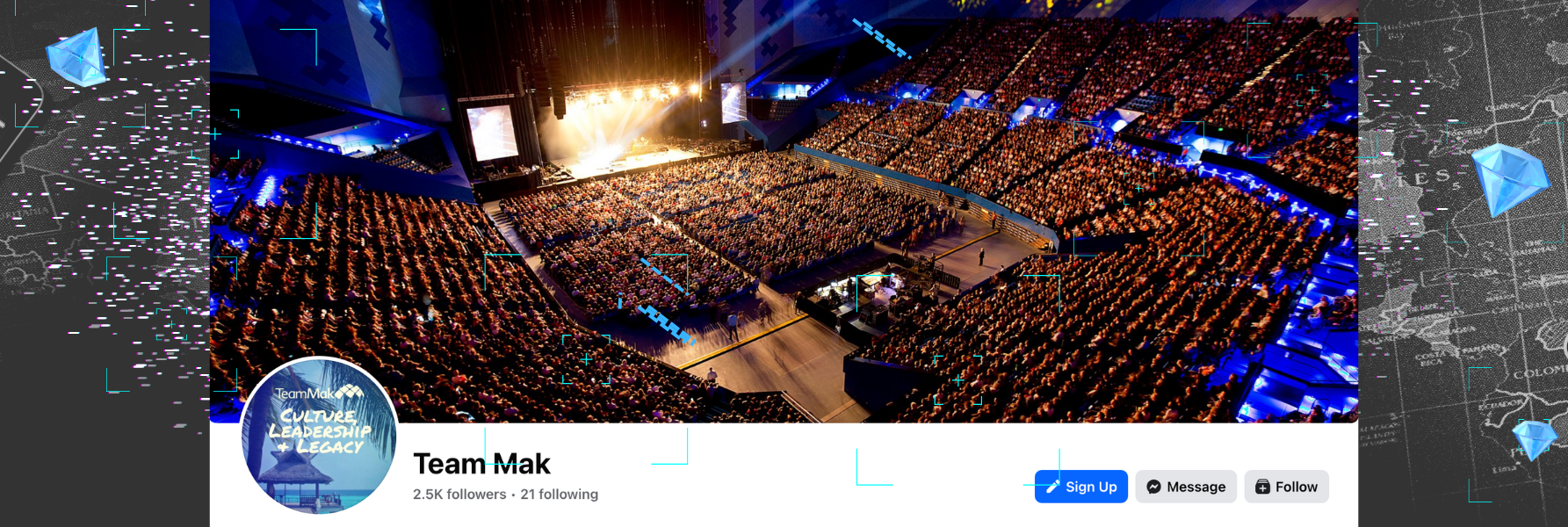
Each Team Mak podcast is about an hour long and Noah tried to listen to three per day while at his day job. Once he got home from work, he would sit down at a desk, study modules and take notes. “The whole people pleasing thing in me at the time was like, I wanna prove to these guys that I’m putting in the work.”
There was “an accountability group chat” on WhatsApp where members updated each other on their targets and which kept people answerable to Legacy’s expectations.
The longer Noah stayed, the more he felt like Legacy was something he had to do rather than something he wanted to do.
Always be recruiting
Documents shared with The Spinoff by ex member David* show Legacy trains its members on exactly how to recruit people in person and online.
1. Spark conversations by asking questions that show interest in their lives.
Legacy has two acronyms for this: FORD (family, occupation, recreation, dreams) and FWHC (family, work, health, circumstances). Members are advised to “not burst their bubble” or “belittle them” but compliment potential new recruits on what they do for work.
The guidelines specifically recommend replying to people’s story posts on social media, and taking advantage of birthdays and holidays as a way into someone’s DMs.
2.When they ask you questions, find creative ways to bring up “mentorship”.
Here’s an example from the document:
Q: Have you got anything planned for the weekend?
A: I do thanks for asking, I’ve actually got a business seminar with my mentors which I’m excited to attend.
Legacy has four key terms it wants members to peddle: “mentors”, “business”, “side hustle” and “retired early 30s”.
An approach from a Legacy member in 2022 (Screenshot: supplied)
3. Only explain what you do if someone shows interest.
Here’s an example from the document:
“I’ve been growing a business within the online space to develop a secondary income stream outside of my job like my mentors have created too. What’s amazing is that they’ve done the same over the past few years in their spare time and have been able to retire in their early 30s which is crazy right?”
4. Present them with a seemingly exclusive and limited opportunity
Here’s an example from the document:
“Hey I can’t promise you anything however I am catching up with my mentors in a couple days and I could potentially see if I can open that door for you to also connect with them. How much value would you place on that?”
There’s a document that lists acceptable names to call Legacy, which include “referral-based mastermind group”, “business development programme”, “entrepreneurship group” and “business academy”.
None of the names or key terms suggest that Legacy’s business also lies in vitamin pills, body scrubs and cleaning products.
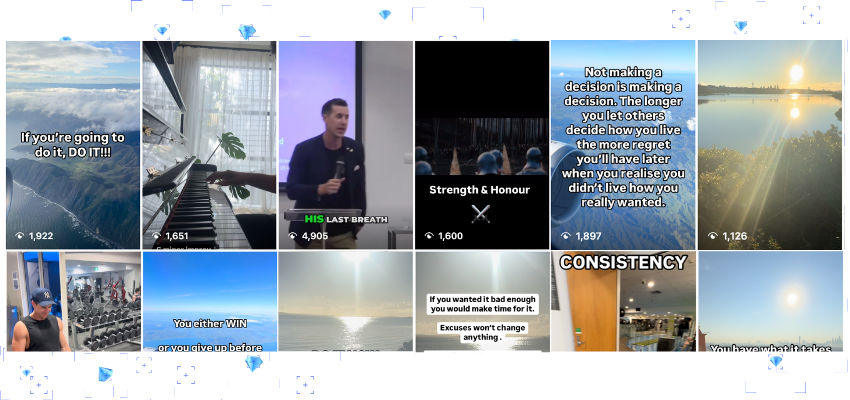
It’s all about the narrative
Noah says members were encouraged to post about Legacy but only some people were allowed to take pictures at events, meaning others could only repost their images. Again, those posts weren’t meant to mention Amway or its products, only “entrepreneurship”, “leadership” and “mentorship”.
The man who recruited Noah would look over his posts before they went live, as well as his messages to potential recruits, and give him feedback or suggest changes. “I always wanted to share authentically. But if someone’s always editing your messages, then it’s not really authentic.”
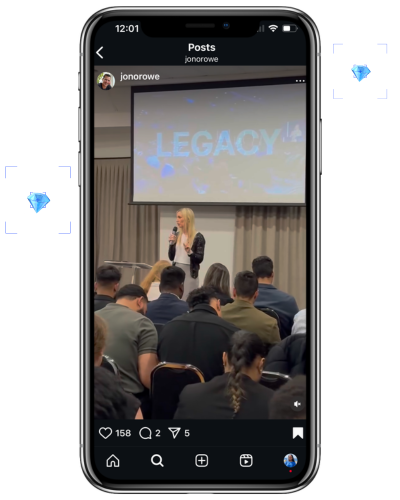 Kirsty Rowe speaks at a Legacy event
Kirsty Rowe speaks at a Legacy event
Noah says Legacy members invest time into their social media because it’s marketing their business – the mentoring rather than the Amway products.
“If you shine a light on yourself to say, ‘I’m wearing a suit and I’m networking with other business people. I’m also a businessman myself’, you’re more likely to recruit people.
“Because they’re like, hey, two years ago he was always wearing basketball shorts and a singlet. But now he’s a businessman, I wonder what happened. You know? It gets them intrigued.”
The price of entry
Noah says he spent more than $1,200 over his six months with Legacy.
Legacy’s internal documents showed what “overhead costs” members had to pay to be a part of Legacy, as of 2022.
The Team Mak app subscription cost more than $600 in 2022 (now it’s more than $700), weekly training sessions with mentors were $240, masterclass events cost $150-250 and conference tickets cost in the ballpark of $500.
Add to that the monthly cost of Amway products, which Noah says was $200 minimum when he joined, and the cost of entry for an annual Legacy membership is just shy of $4,000.
The Spinoff requested comment and interviews with Legacy’s founders to discuss the documents and whether they are still being used but did not receive a response.
Amway responds
In response to questions from The Spinoff, Amway sent a lengthy statement but did not address specific claims. Amway says “there is no minimum product order” but Noah says Legacy asked him to spend a minimum of $200 per month on products.
To register with Amway in New Zealand, Amway says it would either cost a $29 joining fee or $119 worth of products. Legacy’s 2022 documents say it would cost around $399 to “launch” a business with them.
Amway says some IBOs purchase audio recordings and resources from third-party providers but these are optional and Amway does not profit off them.
Legacy’s documents show that purchasing a Team Mak app subscription is necessary to join the group.
Legacy claims members can become financially free and retire in their 30s but whether or not this is from selling Amway products, recruiting new members for business mentoring or a secret third thing is unclear. Amway says its business serves most people as an “additional source of income” to help save for a trip, cover expenses or plan for the future. It says some people might choose to make Amway their primary source of income but “results vary widely from person to person”.
Young, brown, with a ‘hunger to get ahead’
Scan any group photo taken at a Legacy event and you’ll notice a lot of members look like Singh, Noah and David* – mostly men in their 20s, typically Asian, African or Pasifika.
Noah thinks the demographic could be because “people of colour really enjoy community” and are often religious.
Amway confirmed to The Spinoff that some IBOs build teams around “cultural connections” and the company is “proud of the inclusive, multicultural communities that have formed around the Amway business in many countries, including New Zealand”. Legacy’s members appear to be disproportionately brown, but are led by Jono and Kirsty Rowe, both white.
Noah says Legacy members became a tight community, sharing meals at each other’s houses, celebrating birthdays together and doing activities on the weekend. “It felt like family, but I guess at the same time, that’s what makes it kinda hard to leave.”
Legacy’s own documents state they look for recruits who have a “hunger to get ahead”, which goes some way to explaining the heavy representation of gym-goers among its members.
Get them young
Bodo Lang is a marketing professor at Massey University who researches online advertising and has a particular interest in MLMs. Lang says the bare bones of MLMs today are the same as those from decades ago because our human desires to become financially free are the same. “But the tactics and the tools that are being used, they’re different now.”
New approaches include social media influencers using their platforms to promote an elusive yet attainable lifestyle. Lang thinks MLMs are becoming popular again with young people because they want to find their own path and distance themselves from their elders. “A really important way to do that is to not do what your parents are telling you to do, which is probably go to university or learn a trade.”
So being promised something unconventional, like being able to retire in your 30s, serves their need to define themselves. Lang also says a young person’s lack of life experience and awareness of MLMs makes them particularly vulnerable. “They don’t know the name ‘Amway’, they haven’t been around the block… Whereas if you ask somebody who’s 60 or 70, they’ve heard all this stuff like 20 times throughout their lifetime.”
Underpinning all of that is the uncertain economic time New Zealand is in. According to Stats NZ there are 158,000 unemployed people in New Zealand as of August this year, with young people and new graduates bearing the brunt of it.
The promises Legacy makes sound fantastic in this climate, Lang says, and it takes “a pretty analytical determined person to see through that”.

The complaints
Information requested under the Official Information Act revealed the Commerce Commission received 17 complaints about Legacy Collective and Amway between March 2015 and January 2024. It’s unclear if there are other Amway IBOs in Wellington besides Legacy or if the complaints about organisations named “Legacy Collective” are regarding the other Legacy-named MLM that sells Kangen water filter machines.
MLM schemes are legal in New Zealand, and salespeople are expected to sell goods or services directly to consumers, ComCom says. MLMs could still be in breach of the Fair Trading Act if they make misleading or false claims about the benefits of signing up to the scheme or the goods or services the MLM sells.
Former members of Legacy have confirmed that buying Amway products were a requirement of the programme and at least one claims there was little emphasis on the products being sold to consumers outside of the Legacy network. Instead, recruitment was a key focus, with new recruits and “mentors” being the main purchasers of the products as well as the sellers.
A spokesperson from the Commerce Commission told The Spinoff: “The Commission is not investigating Legacy Collective/Legacy Leadership; however, we will continue to monitor any future concerns if raised.”
What is Legacy selling?
Legacy’s internal documents plainly state that it doesn’t sell products and makes no mention of selling a service. “We don’t actually sell products cause there’s not an ongoing nature to an income,” reads the document. “But we use systems and streamline supply chains for everyday goods.”
The same documents distributed to new members outline exactly how to respond when someone accuses the group of running a pyramid scheme. The Commerce Commission defines a pyramid scheme as having participants earn money entirely, or primarily, by bringing other people into the scheme.
“I’m not sure what gave you that idea but it’s actually nothing close to what my mentors do, they actually focus on leadership and mentorship development and leverage equal platforms where we get holistically mentored in all aspects of our life. (Ask questions back – the one who asks questions is in control of the convo).”
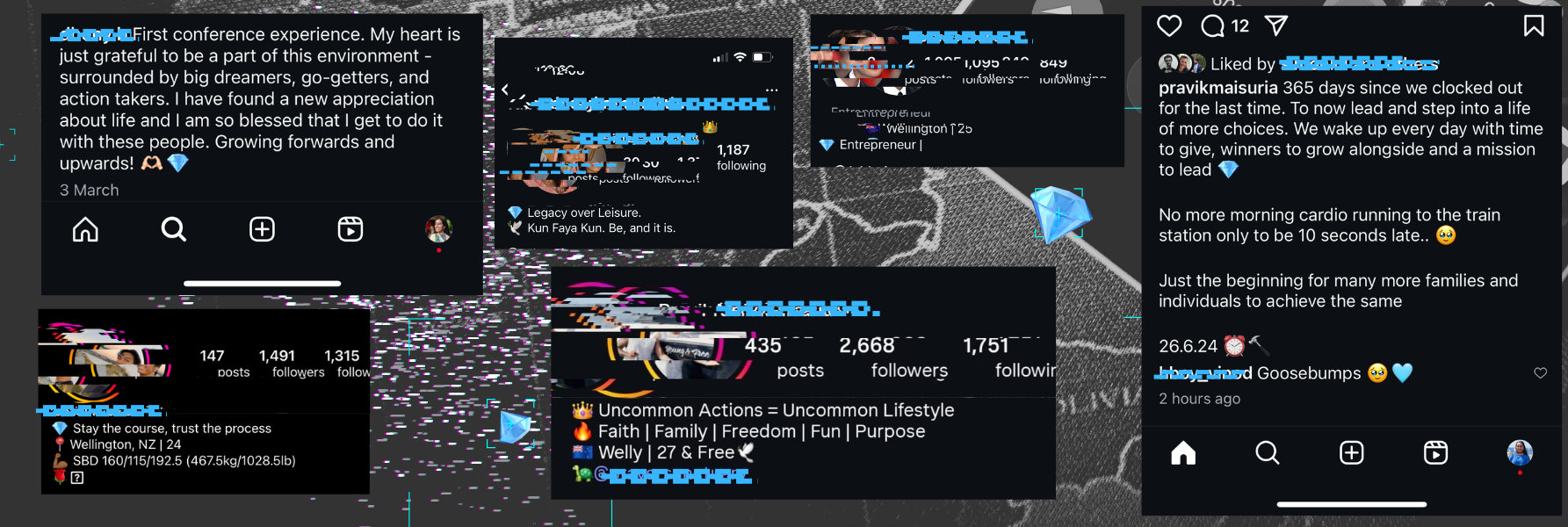
Business mentorship and development would be the service on offer from Legacy. Sarah Trotman, chief executive of Business Mentors New Zealand, says at BMNZ, they believe business mentoring should not be a paid service.
“The mentor is not making a dollar or not gaining anything from it other than a deep sense of satisfaction,” she says. “We are very clear that there cannot be a commercial relationship between them.”
Trotman says business mentoring is ethical when mentees know what they’re signing up for and aren’t surprised at any point during their relationship with their mentor. “Anyone that uses the word mentor needs to use it with great responsibility.” Her advice for MLM recruits is to ask themselves “why are these people so interested in my success?”
“If it seems too good to be true, it is.”
A lasting Legacy
David left Legacy after three months. When he did, he tried talking his friend into leaving too, which prompted one of their higher ups to “belittle” him via messages – something Legacy’s own documentation specifically says not to do.
The senior Legacy member told David he was giving his friend “broke advice” and that he should “keep flipping naans” at his family’s Indian restaurant.
David says the leader eventually deleted his messages and apologised, but David had already taken screenshots and did not forget the conversation.
Noah left Legacy at the end of 2022 for a number of reasons: he didn’t like Amway products, he didn’t want to recruit people and he no longer cared about financial freedom.
The man who recruited him has also since left.
Noah says he no longer wears suits to feel good about himself, but he also doesn’t regret joining Legacy and he’s trying to keep up the good habits it instilled in him. “I’m not going to be Jono Rowe because I’m going to be me.”
He says he doesn’t want to feel like a victim and takes accountability for the actions that led him to join the MLM. “These guys weren’t actually trying to do nothing wrong by me. They were just trying to maybe do good by them.”

